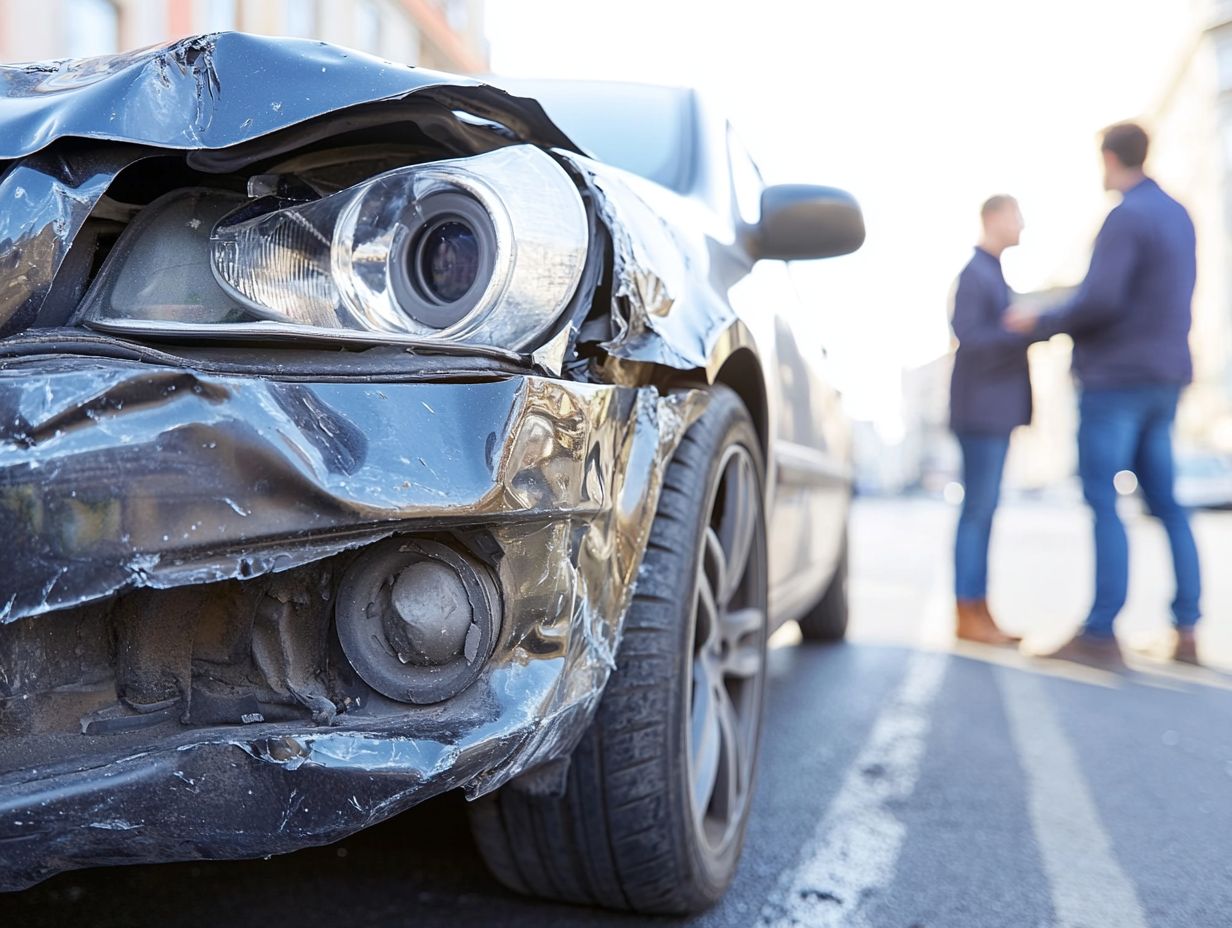What is Collision Coverage?
Collision coverage is an essential aspect of auto insurance that provides protection in the unfortunate event of an accident involving your vehicle.
By grasping its definition and purpose, you can make more informed choices regarding your insurance needs. This article delves into what collision coverage encompasses, the types of damages it covers, and the key factors you should consider when determining whether you need it.
You ll learn how to assess your coverage requirements, understand the associated costs, and explore alternatives to collision coverage. Dive in to ensure you re well-informed and ready for whatever the road may bring!
Contents
Key Takeaways:

- Collision coverage is a type of auto insurance that covers damages to your vehicle in case of a collision.
- This coverage is not mandatory, but it can provide financial protection and peace of mind for car owners.
- The cost and necessity of collision coverage depend on factors such as your vehicle’s value, driving habits, and budget.
Understanding Collision Coverage
Understanding collision coverage is crucial for vehicle owners looking to safeguard themselves against money issues from accidents and roadway hazards. While this insurance specifically addresses damage to your vehicle resulting from an actual collision, it’s also important to know about comprehensive coverage, which protects against other types of damage that may occur.
Whether you find yourself in a hit-and-run scenario or your car suffers damage from a pothole or guardrail, collision coverage offers you peace of mind and the financial backing necessary to repair or replace your automobile.
Familiarizing yourself with collision coverage helps you make informed decisions about your auto insurance expenditures.
Definition and Purpose
Collision coverage plays a vital role in the world of auto coverage, specifically crafted to shield you from the money issues of accidents and vehicle damage.
By covering the costs associated with repairing or replacing your car after a collision, it offers a sense of security and peace of mind. Picture this: you accidentally bump into a stationary object or find yourself in the chaos of a multi-vehicle pile-up. Those expenses can escalate quickly. In these moments, collision coverage ensures that you won t have to shoulder that financial burden alone.
For those of you who often navigate bustling urban environments where minor fender benders are a daily occurrence, this type of policy becomes invaluable. It cushions the financial impact of those everyday driving mishaps, allowing you to drive with confidence.
What Does Collision Coverage Cover?
Collision coverage provides a comprehensive suite of protections designed specifically for damage to your vehicle resulting from accidents where your car hits something. To better understand how this fits with your overall insurance needs, it’s helpful to know how to choose between comprehensive and collision. This coverage gives you the power to effectively manage the financial implications of these unforeseen events, ensuring peace of mind as you navigate the road.
Types of Damages Covered
Various types of damages covered under collision coverage include those resulting from accidents involving another vehicle or stationary objects, as well as damage from theft or vandalism.
Collision coverage can also address damages incurred during rollovers or collisions with animals, which can rack up surprisingly high costs depending on the severity of the impact. Understanding how this coverage works is essential for your financial safety on the road!
Grasping these details enables you to make informed decisions about your insurance coverage, especially when assessing your potential risks on the road.
Do You Need Collision Coverage?

Determining whether you require collision coverage hinges on several key factors. Consider the age and value of your personal vehicle, assess your driving habits, and evaluate your financial situation.
Each of these elements plays a vital role in making an informed decision that aligns with your unique circumstances.
Factors to Consider
When deciding on collision coverage, there are several key factors you should consider: the value of your vehicle, your financial situation, and any outstanding loans or leases tied to your automobile.
If you drive a brand-new luxury model, it s wise to invest in collision coverage due to its high market value and the steep repair costs involved. Conversely, if you own an older vehicle worth only a few thousand dollars, opting out might be smarter, as the premium could easily exceed any potential payout after a minor incident.
If you have limited financial reserves, collision insurance might be essential for your peace of mind, especially if your car is financed or leased. On the other hand, if you have a comfortable savings cushion, you may feel at ease forgoing this coverage, trusting your ability to cover repairs out-of-pocket.
How Much Collision Coverage Do You Need?
When assessing the appropriate level of collision coverage, it’s crucial to evaluate both the market value of your vehicle and your financial capacity to manage potential repair costs independently of insurance.
Evaluating Your Vehicle and Budget
Evaluating your vehicle and budget is essential to determine the right level of collision coverage to protect you from potential financial loss.
By examining the current market value of your car and understanding your specific budget constraints, you can confidently decide on the amount of collision insurance needed. Gather insights from reputable sources, such as online valuation tools or consulting professionals who specialize in automotive appraisals.
Understanding how these factors affect your premium costs and potential out-of-pocket expenses after an accident will guide you in making informed insurance choices that align with your financial objectives.
How to Add Collision Coverage to Your Insurance Policy
Incorporating collision coverage into your existing insurance policy is a simple process, involving just a few essential steps to ensure you have the appropriate protection.
Steps to Take

To add collision coverage, start by contacting your insurance provider to review your current policy and explore available options.
During this discussion, gather detailed information about your existing coverage limits and deductibles. Ask how adding collision coverage will impact your premium and pose specific questions regarding the features it will cover.
If you decide to proceed, your insurer may request that you complete a form or provide documentation such as your vehicle’s identification number (VIN) and details about its condition.
By maintaining open communication and confirming all necessary paperwork, you can easily enhance your policy to include the desired coverage.
Cost of Collision Coverage
The cost of collision coverage can vary significantly based on several key factors, including the type of vehicle you drive, your driving history, and the deductible you choose.
Factors Affecting the Cost
Several factors can influence your collision insurance costs, such as your driving history, the type of vehicle you own, and your chosen deductible.
For instance, a clean driving record often results in lower premiums, while multiple accidents can lead to steep increases. The type of vehicle also plays a critical role; luxury cars typically incur higher repair costs, raising their insurance rates.
The deductible you select can dramatically impact your overall expenses. Choosing a higher deductible decreases your monthly premiums but increases your out-of-pocket costs when filing a claim. Understanding these relationships allows you to make more informed choices, steering you toward better financial outcomes.
Alternatives to Collision Coverage
If you re exploring alternatives to collision coverage, it s essential to examine other types of insurance that might align more closely with your needs and financial situation.
Other Types of Insurance Coverage
Types of insurance coverage like comprehensive auto insurance and liability insurance serve distinct purposes and can complement your collision coverage to create stronger financial protection.
Comprehensive insurance protects against a broader range of damages beyond just collisions, covering incidents like theft, vandalism, and natural disasters. This coverage offers peace of mind in various situations.
Liability insurance covers damages you cause to others in an accident, protecting your finances from potential legal claims.
By combining these policies, you can create a strong safety net that protects you from many risks. This approach ensures you re covered not just for accidents but also for unexpected events, enhancing your overall security on the road.
Frequently Asked Questions

What is Collision Coverage?
Collision coverage is a type of auto insurance that covers damages to your vehicle if it collides with another car or object. For more details, check out what is collision coverage.
Do I need Collision Coverage?
Collision coverage is not required by law, but it is highly recommended for drivers with valuable or newer vehicles. It can save you from hefty repair costs if an accident occurs.
What does Collision Coverage cover?
Collision coverage pays for damages to your vehicle from a collision with another vehicle or object, regardless of who is at fault.
Is Collision Coverage the same as Comprehensive Coverage?
No, Collision Coverage and Comprehensive Coverage are two separate types of auto insurance. Collision covers damages from collisions, while Comprehensive covers damages from non-collision events like theft, vandalism, or natural disasters.
Will Collision Coverage cover my medical expenses?
No, Collision Coverage only covers damages to your vehicle. To cover medical expenses, you will need Personal Injury Protection (this covers medical expenses resulting from accidents) or Medical Payments coverage.
How much does Collision Coverage cost?
The cost of Collision Coverage can vary depending on your driving history, location, and vehicle value. It s best to consult with an insurance agent to get a personalized quote for your specific situation.
Get in touch with an insurance expert today to find the best coverage options for your needs!






